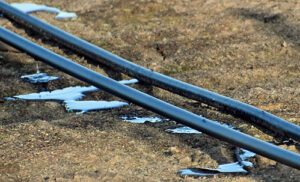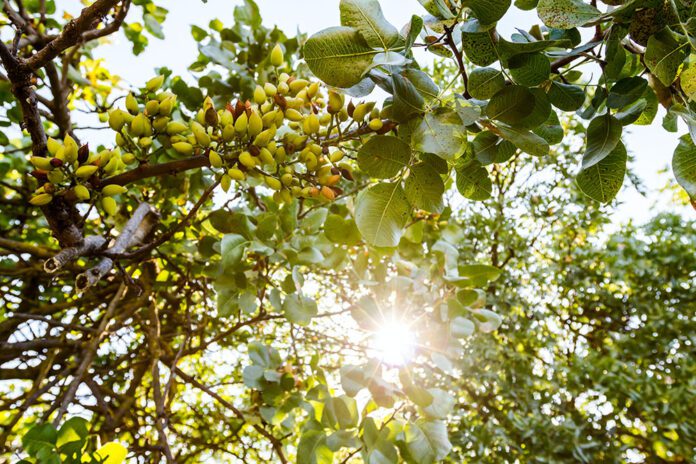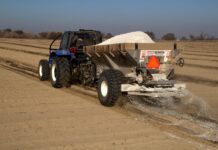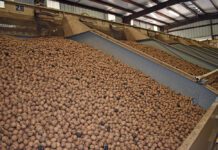It’s been a wee bit hot lately. Let’s get real, maybe only 2 degrees F less than the Devil’s armpit! We have had years before where the entire month of June was over 100. I’m sure there have been Julys that hot as well. But this July was hotter than a Texas BBQ. Trees suffer in these types of temps, especially with lack of chilling at night to offset the shutdown during the day. They have to recover properly in the evening, and water is a huge part of that. We need to be more diligent to keep them healthy and productive. Sometimes, we need to change the way we water in the heat of the moment.
Typical irrigation sets run 24 to 48 hours. Many growers are often chasing that elusive and mythical deep water of summer. A good agronomist buddy of mine, Guy Brautigam, used to tell me there wasn’t any water in the soil of any significance after the fourth of July. I’ve seen the data to prove him right. The thought that we have to get water to 3 feet to keep trees healthy all summer is definitely in question now. I have seen year after year experiments from very good growers that keep things growing and healthy with 18-inch pushes of water.
The arguments I have had with growers getting surface water deliveries and not having access at all hours of the day are legitimate. Running your own wells can give you the luxury of irrigating every night or every other night. But if we can get surface water, we need to use it. However, if water is ordered and we can run two nights in a row at 12 hours instead of one long 24-hour set, I’ve seen data that suggests better penetration and efficacy from splitting the set.

Obviously, there is significant savings when you’re pumping for electrical use off-peak. The evaporation that happens in the heat of the day is less. Absorption of water without going fully anaerobic can also keep the good soil biology active and alive. You’ll also have the opportunity to inject needed nutrients in the same week that may not be compatible to run together. The soil has a buffering effect and can be made more efficacious by the active soil biology. There are so many advantages to pulse irrigating if you can pull it off.
With most of my influence in the tree nut industry, and more specifically being able to run experiments on my own farm, I’ve found water efficacy is critical during nut fill for us. We must get that right or lose yield, period. But so often we overwater almonds late in the season and run into mold and fungal issues. We try to push that water deep as well and then go too long between sets. Nuts can get too dry and sticky on the tree. Smaller shots can help that. In pistachio, in my experience, those smaller shots, given more often, have led to more split nuts and heavier nuts.
Foliar sprays are also very dependent on the water stress in our trees. Making sure our crops are hydrated before a foliar spray shows better nutrient uptake in those blocks. Give them a shot of water as close as possible to a spray. Long irrigation sets must dry down significantly longer before a spray to get equipment in and out. If you are running smaller shots more often, you can get in sooner. Your nutrition shots will be better absorbed with happy trees.
Water management in a state like California is becoming more and more difficult. Not knowing year to year what our allocations will look like is nerve-racking to say the least. Having two back-to-back, phenomenal rain and snowpack years only to see a water allocation of 40% is mindboggling. Getting blamed for wasting water, while growing food, is ludicrous. Yet here we are.
We must keep getting better and better at making every drop count. Fortunately, we are. Changing our irrigation practices can be a daunting task depending on the logistics of your operation. Keep in mind, the savings and benefits can be significant. The best growers in the world here in the valley never cease to amaze me with their ingenuity. Making more changes every year is impressive to say the least. We are making it happen, but year after year, we see thoughts change and practices improve. The old saying, “If you can’t stand the heat, stay out of the kitchen,” may need to be changed for growers. We thrive in it. If you can stand the heat, you’re probably a farmer!
















